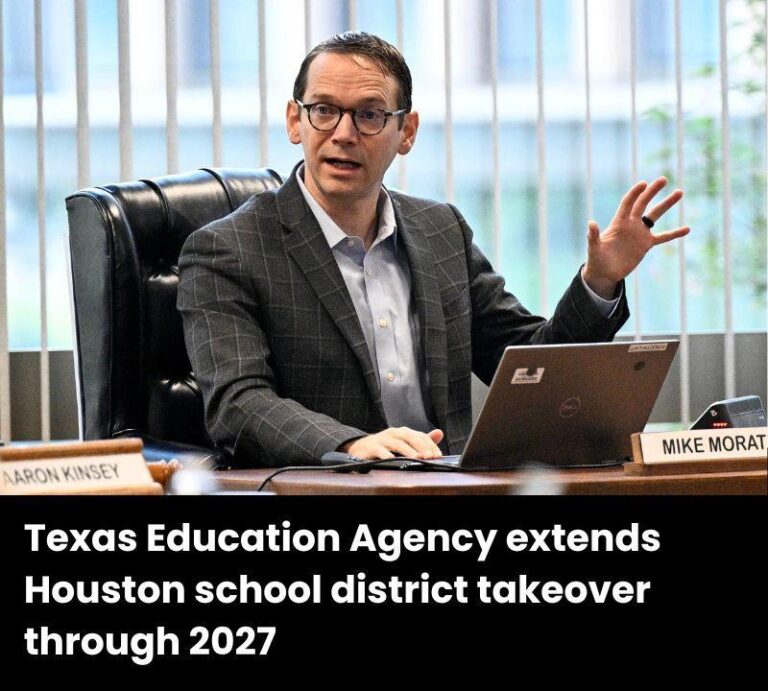The Texas Education Agency (TEA) has announced the extension of its takeover of the Houston Independent School District (HISD) through 2027. This move underscores the agency’s ongoing efforts to address persistent challenges within Texas’ largest school district. The continuation of state oversight highlights the complexities of managing educational improvement amid concerns over academic performance, governance, and financial stability. This article examines the implications of the extended takeover for students, educators, and the broader Houston community.
Texas Education Agency Prolongs Oversight of Houston School District Amid Ongoing Challenges
The Texas Education Agency (TEA) has announced the continuation of its direct control over the Houston Independent School District (HISD) until 2027, citing persistent challenges in academic performance, governance, and financial management. This decision marks a significant extension beyond the original oversight timeline, reflecting deep-rooted issues within the district that impede progress toward state standards. Despite efforts to stabilize leadership and implement reforms, the agency remains concerned about the district’s capacity to independently manage its operations and improve student outcomes.
Key concerns prompting the extended intervention include:
- Low graduation rates particularly among historically underserved student groups.
- Chronic budget deficits that threaten long-term financial sustainability.
- Lapses in compliance with state education requirements and accountability standards.
- Leadership instability, characterized by frequent changes at the superintendent and board levels.
| Metric | Current Status | TEA Target for 2027 |
|---|---|---|
| Graduation Rate | 75% | 85% |
| Budget Deficit | $30M | Balanced Budget |
| Leadership Stability | 4 Superintendents in 5 years | Consistent Leadership Team |
Impact of Extended State Control on Students and Educators in Houston
The extension of state control in Houston’s school district has created a complex landscape for both students and educators. Many students have experienced a heightened sense of instability, as frequent administrative changes disrupt established routines and educational programming. Parents and community members voice concerns about the long-term implications on student achievement, particularly in under-resourced neighborhoods. Meanwhile, educators find themselves navigating a shifting policy environment that impacts curriculum choices, professional development opportunities, and classroom autonomy. Key challenges include:
- Decreased teacher morale due to uncertainty about job security and roles
- Struggles to maintain consistent educational quality amid ongoing leadership turnover
- Diminished community input in decision-making processes
- Pressure to meet state-mandated performance metrics at the expense of holistic learning
On the other hand, some districts under state control have reported incremental improvements in standardized test scores and graduation rates, although critics argue these gains don’t fully reflect the broader educational experience. The extended oversight has also prompted increased investment in data-driven instruction and interventions, aiming to support struggling students. However, this approach sometimes clashes with educators‚Äô preferences for more adaptable and culturally responsive teaching methods, highlighting an ongoing tension between state mandates and local needs.
| Aspect | Positive Effects | Negative Effects |
|---|---|---|
| Student Outcomes | Improved test scores | Increased stress, lower engagement |
| Teacher Experience | Access to new resources | Job insecurity, reduced autonomy |
| Community | Enhanced accountability | Limited local input |
Experts Call for Targeted Interventions to Address Academic Performance
As the Texas Education Agency extends its oversight of the Houston school district through 2027, education experts emphasize the urgency of deploying precise and data-driven strategies to uplift student outcomes. They argue that generic approaches have fallen short in addressing disparities, calling instead for interventions that recognize the unique needs of each campus and student demographic. Key focus areas include:
- Targeted literacy programs aligned to grade-specific challenges
- Enhanced after-school tutoring tailored to underperforming student groups
- Professional development for educators on differentiated instruction
- Integration of social-emotional support to foster a holistic learning environment
Experts also advocate for continuous monitoring and transparent reporting to ensure accountability throughout the district’s recovery process. The table below illustrates proposed metrics to evaluate intervention effectiveness over the coming years:
| Metric | Baseline (2023) | Target (2027) | Measurement Frequency |
|---|---|---|---|
| Reading Proficiency Rate | 48% | 75% | Annual |
| Math Proficiency Rate | 42% | 70% | Annual |
| Chronic Absenteeism | 22% | 10% | Biannual |
| Student Engagement Score | 3.1/5 | 4.5/5 | Quarterly |
Community Voices Emphasize Need for Greater Transparency and Local Involvement
Residents and advocacy groups across Houston have voiced strong concerns over the extended state control of the district, calling for enhanced transparency in decision-making processes. Many argue that the continued takeover limits community input, often leaving families and educators feeling sidelined in discussions that directly impact their schools. Local leaders emphasize the importance of accessible, clear communication from the Texas Education Agency (TEA) regarding their plans, metrics for success, and timelines for restoring full local governance.
Community forums and town hall meetings have become critical platforms for parents and teachers to assert the need for greater involvement. Suggestions include:
- Formation of advisory boards with community representatives
- Regular public reporting on progress and challenges
- Opportunities for direct feedback on policy changes and leadership appointments
Such initiatives are seen as vital steps toward rebuilding trust and ensuring the district’s revival reflects the values and needs of Houston’s diverse neighborhoods.
Key Takeaways
As the Texas Education Agency extends its takeover of the Houston Independent School District through 2027, the state’s involvement in the district’s governance will continue to shape the future of education for tens of thousands of students. The extended intervention underscores ongoing challenges and the agency’s commitment to improving academic outcomes. Stakeholders across the district face a critical period as they navigate the implications of prolonged state oversight and work toward sustainable progress in one of Texas’s largest school systems.




